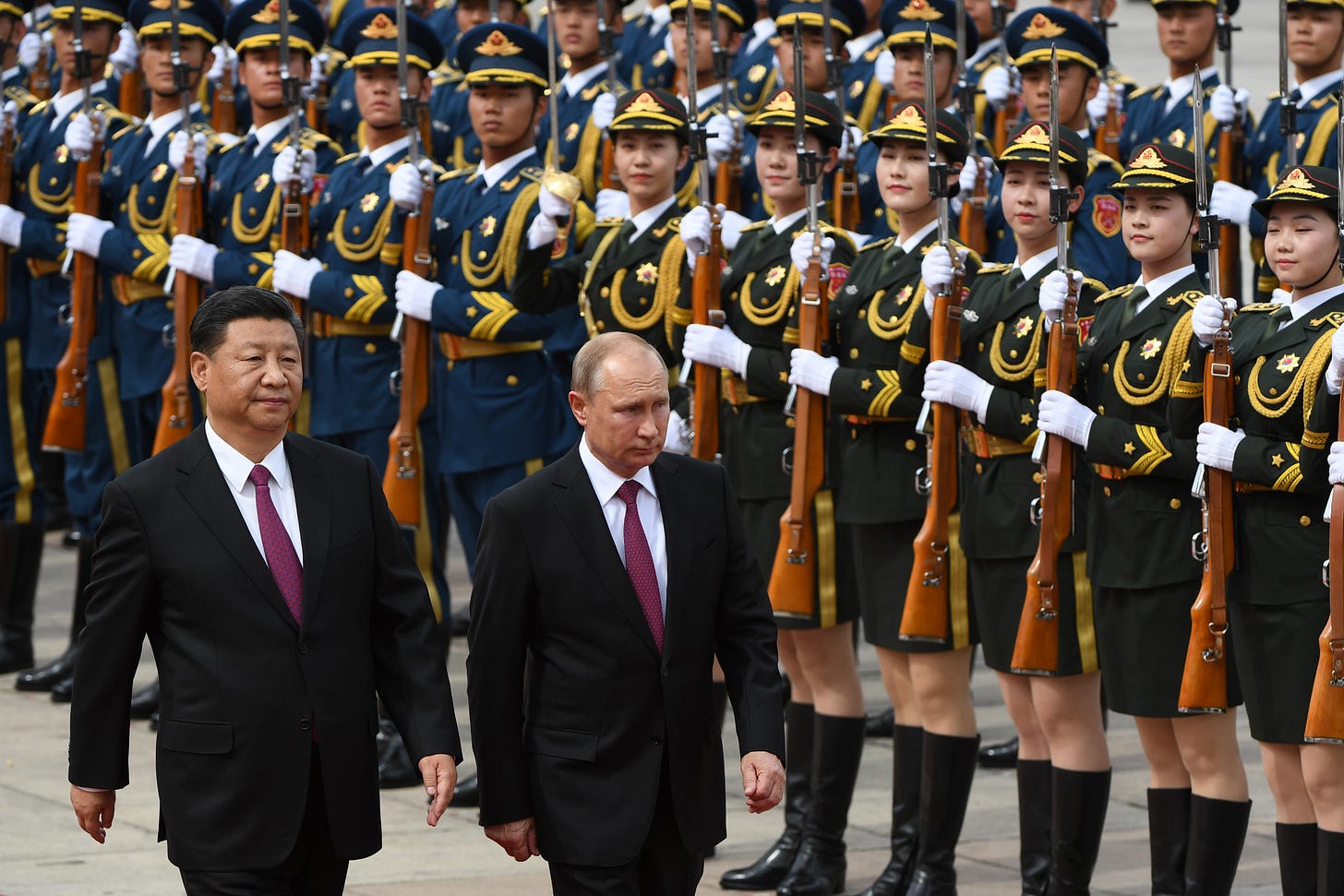TL(PM) DIGEST: Beijing just doesn't know how to quit Moscow
Plus paying off Justice Thomas, America's big bet on Intel, and Americans really don't like China

1. China deepens strategic ties with Russia
What happened? China’s defense minister will embark on a four-day trip to Russia this weekend, showing once more that Beijing seeks to strengthen its military ties with Moscow even as the Kremlin continues its war against Ukraine. The announcement comes as leaked U.S. intelligence documents indicate that China has already begun to secretly send weapons to Russia in support of Moscow’s war effort.
Why does it matter? A number of foreign leaders like Brazilian President Lula da Silva have publicly stated their hope and desire that the Chinese government will use its influence with Moscow to bring about an end to the war in Ukraine. But while Beijing has warned the Kremlin to back off its nuclear threats, it has not wavered from its general support for Russia’s war or its “no limits” partnership with Moscow.
TLP’s take: There’s no reason to believe China will play a constructive role in any diplomatic attempt to bring Russia’s aggression against Ukraine to an acceptable end. Nor is there much reason to worry about alleged American “inflexibility” pushing Moscow and Beijing together; it ought to be clear by now that both governments desire a close partnership even if, as China’s negative reaction to Putin’s nuclear threats shows, it does in fact have at least some limits.
2. Here’s a novel idea: no lavish gifts and payouts to Supreme Court justices
What happened? ProPublica reported yesterday that billionaire conservative donor Harlan Crow bought several properties in Georgia from Supreme Court Justice Clarence Thomas and his family. Justice Thomas did not disclose these real estate deals as required by law.
Why does it matter? These questionable real estate transactions come on top of reports about Crow’s lavish gifts to Thomas and his wife over a twenty-year period. As the New York Times details:
The long list of comforts provided to Justice Thomas and his wife, Ginni, was shocking mainly in its rococo extravagance. Nine days of island cruising in Indonesia on a fully staffed superyacht. Regular flights on a private jet. Summers at a private resort in the Adirondacks, and every dollar of it paid by Harlan Crow, a real estate baron from Texas who has spent millions for decades to elect Republicans and on efforts to push the judiciary to the right.
TLP’s take: The fact that billionaires with interests before the Court can spread riches upon a sitting justice without any legal consequences for anyone involved is manifestly absurd. Thomas’ dubious ethical behavior should lead Congress to pass a strict law that prohibits any federal judge—and any member of Congress or the executive branch—from accepting any gifts whatsoever from private sources.
Supreme Court justices work for the American people—they should act like it.
3. Intel’s semiconductor struggles
What happened? The Financial Times reports on long-time American chipmaker Intel’s struggles to rebuild itself, a decade after its disastrous decision to forego investment in the latest, cutting-edge chip manufacturing technology called “extreme lithography.” Intel hopes to take advantage of funding from the CHIPS and Science Act as it ramps up production of chips with this advanced technique later this year.
Why does it matter? Thanks to the parlous state of America’s wider semiconductor industry, the nation “has little choice but to bet heavily on Intel, despite it being the laggard in one of the tech world’s most important races.” While the company has fallen behind overseas rivals like TSMC, Nvidia, and AMD, it’s taking advantage of $12 billion in potential CHIPS subsidies to open “a spate of giant new manufacturing plants” in Arizona and Ohio.
TLP’s take: America should never have let itself get in the position where a bad business decision taken by one company could leave it bereft of capacity in a key industry like semiconductor manufacturing—or where it has to decide between supporting that one company or seeing its own chipmaking industry wither and die. But we are where we are today, and we’ve got to do our best to make sure our national bet on Intel succeeds.
4. Americans don’t like China’s aggressive new role in the world
What happened? New polling from Pew Research finds that 83 percent of American adults hold a negative view of China—including 44 percent who hold a very negative view. More than 6 in 10 Americans also say the partnership between China and Russia is a very serious problem for the United States.
Why does it matter? Attitudes towards America’s chief international rival continue to harden as China’s actions around the world, specifically its backing of Russia’s war on Ukraine, generate increasing public concern. Only 15 percent of Americans believe China contributes to peace and stability around the world and more than three quarters believe China interferes in the affairs of other countries.
TLP’s take: With progressives and far-right forces joining hands to go soft on China, those in the sensible middle must continue forging their own alliances to check China’s growing power and protect American interests. The American people clearly understand that China is a major challenge, and our political leaders should keep fortifying the country against economic and security threats not far on the horizon.
Just one more thing…
The European Space Agency’s Jupiter Icy Moons Explorer (aka JUICE) probe blasted off from French Guiana this morning on a mission to survey three of Jupiter’s moons: Callisto, Europa, and Ganymede.





